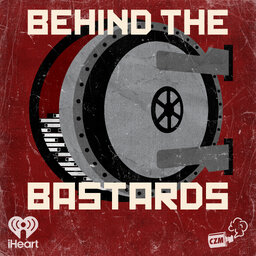Part One: The Terrible Secret of Steve Jobs
Robert sits down with Ed Zitron to discuss the early life of Steve Jobs, who started out setting off bombs in school and wound up founding
In 1 playlist(s)
Behind the Bastards
There’s a reason the History Channel has produced hundreds of documentaries about Hitler but only a …Social links
Follow podcast
Recent clips

Part Four: How Jeffrey Epstein Helped Build the Modern World
1:10:16

Part Three: How Jeffrey Epstein Helped Build the Modern World
1:06:22

Part Two: How Jeffrey Epstein Helped Build the Modern World
1:02:28
 Behind the Bastards
Behind the Bastards